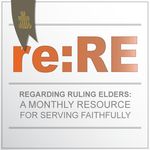Back in the days when circuses traveled the land, there was a strongman as one of the sideshow acts that would demonstrate his power before a large audience. Toward the end, he squeezed the juice from a lemon between his hands. He then said to the audience, “I will offer $200 to anyone in the audience who can squeeze another drop from this lemon.”
A thin, scholarly looking elderly woman with glasses on a chain around her neck, came forward, picked up the lemon, squeezed it hard, and managed to get a drop of juice out of the lemon. The strongman was amazed. As he paid the woman the $200, he said, “I’ve got to ask, ‘What is the secret of your strength?’”
“Practice,” the woman answered. “I was the treasurer of First Presbyterian Church for thirty-two years and have always had to squeeze something out of nothing!”
Often the task of our church treasurers seems to always be to try to make something out of nothing. The task of the church treasurer is not easy. Sessions, not to mention pastors or even congregations, often ask treasurers to find ways to pay for the things they want or believe the church needs to fund. Almost inevitably, this can lead to tensions between the session and the treasurer. Sessions can be perceived by treasurers as spending without regard for the church finances and treasurers can be perceived as unreasonably standing in the way of the session’s funding of church ministry.
So how should ruling elders and church treasurers relate?
The Book of Order only provides one reference to treasurers. The Form of Government, G-3.0205, says “The session shall elect a treasurer for such term as the session shall decide and shall supervise his or her work or delegate that supervision to a board of deacons or trustees.” But from that one sentence, we see a couple of important things about how ruling elders on a session and treasurers are to relate.
This declaration is a reminder that it is the session that elects the treasurer. The treasurer is not chosen by the pastor or even by the congregation as a whole. The session elects the treasurer. That’s also why the session shall decide and shall supervise the treasurer’s work. To put it another way, the treasurer’s ultimate responsibility is to the session. This is the reason that the full text of G-3.0205 includes that sessions shall make sure certain procedures are followed regarding the counting and recording of offerings; the keeping of financial books and records that are also open to inspection by church officers (which is what session members are); and at least annual reports of all financial activities.
One other important note is that G-3.0205 says that the session shall elect the treasurer to “such term as the session shall decide. …” Treasurers are not elected for life though sometimes it probably feels that way. Instead, they are elected for a term—that term can be one year or ten years or any length set by the session—as long as there is a specific term length.
That term length can actually be a great opportunity for the ruling elders and treasurer to relate. When the end of a treasurer’s term is approaching, a session can be helpful to treasurers, especially treasurers that the session wants to have to continue, to not only ask if the treasurer wants to continue but to really listen to the treasurer’s answer. Many times, out of love for their congregation, a treasurer will say something similar to, “Well, if no one else will do it, I guess I can do it again.” And a session will leap on that as all the answer they need. But what if ruling elders really listened to that answer as an opportunity to have a meaningful conversation with the treasurer about whether she or he wants to continue and what, if any, adjustments can be made. The work is difficult and stressful enough without feeling like you can never step away from it.
Treasurers are a valued and necessary person in every congregation. The task may often seem like squeezing out one more drop of juice from a dried up lemon but the vast majority of treasurers never quit trying to do so. In that way, ruling elders and treasurers are exactly alike—they both love their congregations with all their hearts and all their souls. That may be the most important thing of all to know.
The Reverend Ted McCulloch has been the stated clerk for the Presbytery of Lake Huron since April 2010. He has served congregations in Birch Run and Saginaw, Michigan. Ted’s favorite saying is that the church should be a hospital for sinners and not a museum for saints and hopes as both pastor and stated clerk, he serves in that spirit.
For more about the information provided here, please contact Martha Miller at martha.miller@pcusa.org and browse the Ruling Elders website.

